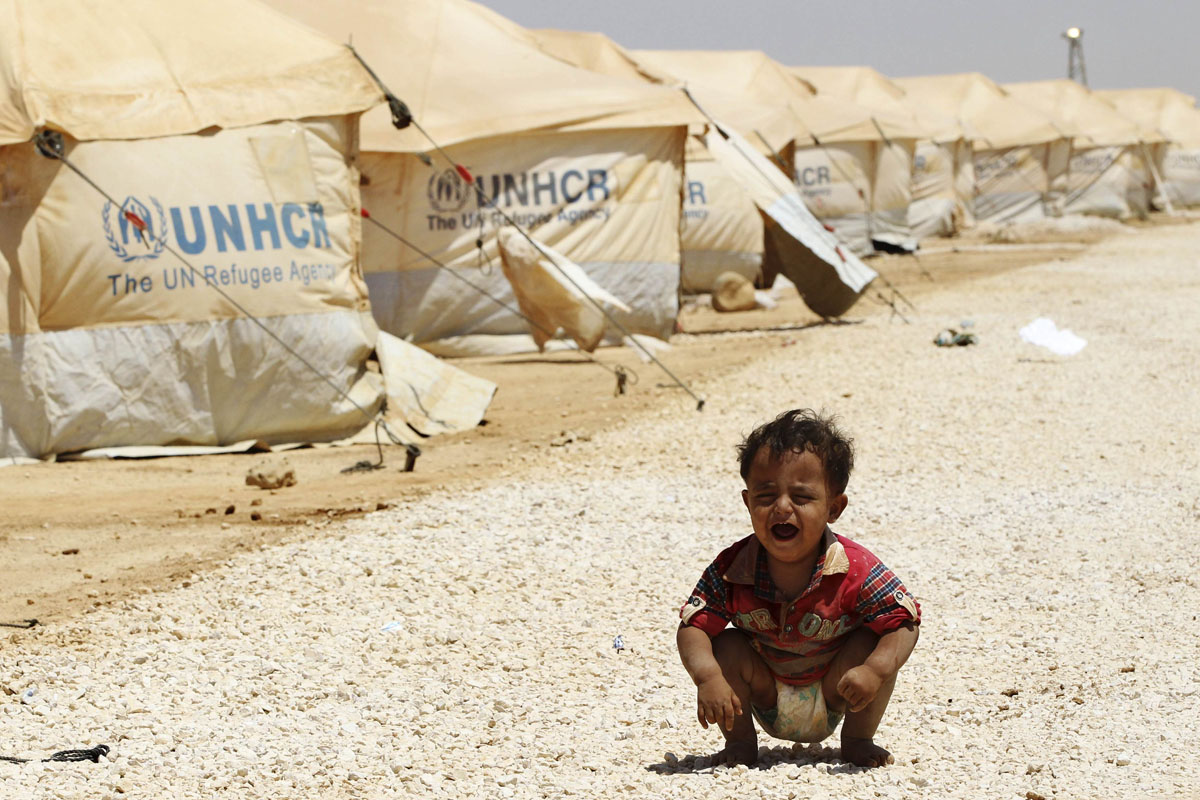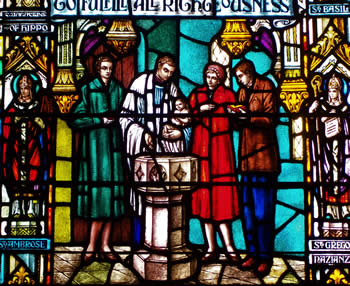I am haunted by the images of Syrian and other refugees. I still remember, a couple years later, a YouTube video posted by the Save the Children campaign in London.
More recently, they’ve done a video and informational link here. The photo, too, of Aylan Kurdi, the toddler who drowned along with his mother and brother while his family were trying to escape, has made waves in social media and has created an “outpouring of grief” and numerous renditions from political cartoons.
As with many problems around the globe, there are no clear-cut answers to the crises in Syria and other places refugees are fleeing, at least in terms of political action as modern society understands political action. For us individual Catholics, there almost no clear votes we can take, no boycotts, no unarmed protests, no sure letters we can write to our representatives. (One might be to sign this petition to increase asylum options.) Those are the typical ways we have responded in political situations in past decades.
Social media goes only so far, too. Even as we share the photo and express grief – even as I blog about this – aren’t we all too aware of the fact that this is likely to become yesterday’s news, a forgotten blip, as with so many other horrific events, that might be recalled on the New Year’s Eve frenzy of 2015 “Looking Back Over the Year.”
In the midst of this crisis, our unity with Syrian Christians in the Body of Christ, as well as our knowledge that all humans are created in the image of God, means that we must act with the faith and hope of the risen Christ. Here, as in all theological questions, the great commandments to love God and love neighbor are inseparable.
How, though, do we do that, with a distant crisis and one in which no political situation, no social media, seems an obvious way forward?
I suggest the following – which will seem paltry, and which is likewise communicated via social media – but my hope is to add my small voice to those of others seeking peace in Syria and places of hope and rest for its refugees.
1. Memory. If we are to be moral people, memory is required. Augustine teaches us this in his book Confessions. Augustine says that memory is the very means by which we can think about, reflect on, and understand our world. Memory causes Augustine to be acutely aware of people and places and his own sin, which he recounts in the book. “I cannot grasp all that I am. The mind is not large enough to contain itself.” (Book X. 8, 15) This realization propels Augustine toward God, toward realizing his desire for rest in God, realizing his desire for true peace.
Let us remember, especially in this age of social media. At the least, social media – via search engines – has a technological memory that can be recalled. Let us post and repost. Let us write. Let us not forget the moral questions that we might otherwise treat as the latest new news.
2. Prayer. Augustine writes strongly about the need for prayer in conjunction with hope. His brief writing on hope in The Enchiridion is a meditation on the Lord’s Prayer: “It is only from the Lord God that we must ask for any good deeds we hope to do….” (Ench., 30, 114). This is no where more the case than with respect to a distant land with a war that many Americans do not really understand.
3. Charity. Thomas Aquinas says that “the object of hope is a future good, difficult but possible to obtain. Now a thing is possible to us in two ways: first, by ourselves, secondly, by means of others.” (ST II-II.17.1) The idea that there might be peace and a place to call home for refugees is certainly difficult – not only because of the situation itself, but also because we in the US are (in general) far removed from the crisis. Let us rely on others, however, who are there and who go in our name.
Donating to charities, as a moral action, is of course fraught with all kinds of complications and quid pro quos. But it is still what we have, and who we have – and donating money can do far more from us than if we were to try, in our distant way, to help a situation that we do not understand (recall the winter coats and recreational sports goods sent to earthquake and tsunami victims in recent years!).
Catholic Relief Services sends the vast majority (at least 92%) of its money directly to aid programs that help.






The Syrian refuge crisis is very instructive, as it demonstrates again that if we don’t go to the world’s troubles, those troubles will come to us.
Apologies, but it is not memory, prayer and charity that the Syrian people need from us, but air cover, arms, training, on the ground allies in the fight against the monsters that plague their homeland.
No one is far removed from the crisis, that’s no longer possible in the modern world. That’s what the Syrian people can teach us.
Thank you for this post. I think another thing we can do is to keep reminding each other of the obligation to welcome the stranger that is such a key theme in our Scriptures. Yes, it is a hard teaching. Yes, it must be contextualized and interpreted. But the teaching must challenge us to recognize human dignity as more central to identity than citizenship/nation-state. In the US context, we’re seeing a resurgence of white nativist ideology that is strangely ahistorical. As you rightly say, the refugee crises are thorny and complex issues and it is hard to know what to say or do. Your post has given me a lot to think about and pray with. Thanks.
Jana, you write…
“As with many problems around the globe, there are no clear-cut answers to the crises in Syria and other places refugees are fleeing…”
What would be the solution if criminals tried to take over your or my neighborhood?
We would call the police! We would demand that people with guns come to our neighborhood and restore peace immediately. Responding to murderous criminals is never complicated when it involves us and our neighborhood.
Responding to murderous criminals only becomes a confusing case of “no clear cut answers” when the criminals are victimizing somebody else somewhere else.
The Syrian people are teaching us a great lesson which may liberate us from our self delusion confusion. They are teaching us there is no longer a place called “somewhere else”.